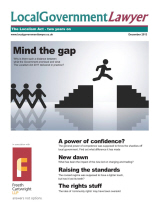The rights stuff
- Details
 Both the results of the survey and the discussion at the roundtable suggest that the ‘community rights’ in the Localism Act have been oversold. Derek Bedlow explains why
Both the results of the survey and the discussion at the roundtable suggest that the ‘community rights’ in the Localism Act have been oversold. Derek Bedlow explains why
The Government has been very keen to emphasise that localism is not just about devolving more power to councils, their members and officers, but rather to communities.
And key to this has been the introduction through the 2011 Act of a number of so-called ‘community rights’ to work alongside the likes of initiatives such as neighbourhood planning. These included:
• The Community Right to Bid (originally called the Community Right to Buy). This allows local residents to nominate ‘assets of community value’ such as pubs, football grounds, village shops, parks, libraries and the like. Where an asset on a local authority’s register is put on the market, the sale is delayed for six months to allow members of the community to put together a bid.
• The Community Right to Challenge. This gives community or voluntary sector groups, parish councils and local authority employees in England the legal right to challenge the way a service is run and, potentially, take it over. Under this right, the council must consider the impact of the proposal. If it turns down the proposal, it must give reasons. If a challenge is accepted, this does not mean that those submitting the challenge will necessarily get to run the service as the council has to run a tendering exercise.
The Department for Communities and Local Government said in December 2010 that these “revolutionary new rights” would protect and transform local services. The Communities Secretary, Eric Pickles, added that the rights were “a massive opportunity for the community and voluntary sector to demonstrate their innovation and the new ideas they can bring to the table for better, cost-effective services”.
So what has the take-up been like? In relation to the Community Right to Bid, half of our respondents (49%) said it had been used ‘a bit’. The other half (51%) said it had not been used at all. None reported it being used widely.
“It is just beginning to find favour – mostly used for pubs and sometimes used to block a sale,” reported one senior lawyer. A campaign by CAMRA (the Campaign for Real Ale) is seen to have had an impact, while a number of football grounds – including Old Trafford, the home of Manchester United – have been registered.
Of those respondents to comment, most suggested that the take-up had been limited to a handful of cases.
One senior lawyer, meanwhile, claimed that this community right had been ‘mis-sold’, an opinion backed up by the follow-up roundtable. “The public believed that they could prevent sales of pubs, etc and replacement of these by houses, and we have been the messenger of bad news that all they have is the right to delay a sale and ‘participate’ in the process,” they said, adding that the planning rules had more impact on safeguarding these facilities than the “convoluted” Community Right to Bid process.
However, the roundtable did identify one – unintended – way that the Right to Bid regime could become significant. With recent changes to village green legislation now blocking its use as a delaying tactic, the use of the Right to Bid as a means of delaying or frustrating development may come to the fore.
Challenging times
The picture for the Community Right to Challenge (CRC) is less positive. Just 13% of respondents reported it being ‘used a bit’, with the remaining 87% saying it had not been used at all. Again, none said the right was being used widely.
One senior lawyer reported that their council had been carrying out its own change and transformation programme and opening up the CRC was linked to the outcome of those ongoing reviews.
According to one senior lawyer, however, part of the problem was that many council services were already provided under contracts. Another respondent described the Community Right to Challenge as a “misconceived piece of legislation”.
If community groups are interested in taking over management of facilities, “and if this is a sensible idea”, it is much better for the local authority and the community group to come up with a plan, they said. “The flaw in the community right to challenge is that it can prompt a procurement exercise and, rather than community management, lead to Serco or similar winning the contract.”
Many respondents insisted that their authorities had sought to support and encourage the take-up of the rights, whether through the adoption of policies and procedures, promotion through the council’s website and the local press, and engagement work with parishes or local area committees. “We have undertaken neighbourhood engagement pilots and discussed these options,” said one lawyer. “[However], the feedback from the communities was that they did not want to run the services but did want better engagement with the council.”
Another wrote: “Policies and procedures have been adopted. There is just little appetite with the Community Right to Bid as any relevant assets are generally owned by the parishes. The Community Right to Challenge has not registered at all, but as a council we do work with local businesses and suppliers frequently and engage with them well.”
When considered by the roundtable, the main reason for the lack of traction in this area is that while funding is available for bidders, the skills and resources required to put a bid a together are likely to be beyond most lay people.
The receipt of a bid triggers a procurement process, leaving community groups at a significant disadvantage to long-established outsourcing companies, leading one member of the roundtable to remark that the Right to Challenge is a very “oversold” power. It puts local authorities and their lawyers in a slightly awkward position. Few community groups are likely to have the experience (or time) to deal with the bureaucracy involved, but should the council help them or remain neutral?
The Right to Challenge also, the roundtable noted, had the unintended consequence of forcing local authorities to publish a schedule of their outsourcing plans.
Despite the obstacles, however, the survey did uncover some examples of the new rights in action. One respondent highlighted how their council had received national recognition for its ‘Your Neighbourhood, Your Choice’ scheme. “Residents are surveyed to give their opinions on where investment should be targeted, with substantive funding given to support community schemes,” they said.
Another pointed to how their authority had achieved the objectives behind the rights without them being actually used. “We have done little specifically other than opening up the window for expressions of interest. However, without use of these rights, the council is progressing the establishment of two mutuals, some assets are already community managed and the direction of travel is clearly in that direction.” [Although neighbourhood planning was not specifically covered in this survey, it seems that more work has been conducted in this area.]

Regulatory/Litigation Lawyer
Deputy Director Legal and Democratic Services
Legal Adviser
Legal Director - Government and Public Sector
Governance Lawyer
Locums
Poll


















